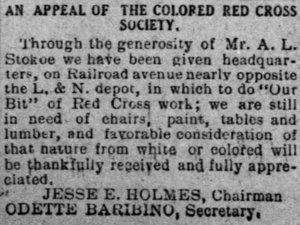Jesse E. Holmes facts for kids
Rev. Jesse Elmer Holmes (born 1857, died 1921) was an important minister and community leader in Mississippi during the late 1800s and early 1900s. He worked to improve life for people in his community, especially African Americans.
Contents
Early Life and Ministry
Jesse Elmer Holmes was born in October 1857 in Yazoo County, Mississippi. He was the youngest child of Jesse and Delia Holmes. He went to local schools and, like his father, became a farmer.
He also became a pastor in the Methodist Episcopal Church. He started his work in the Yazoo City area. People respected him as a leader in both his church and the community. He was known for being a conservative person, meaning he liked traditional ideas and values. Both white and Black people respected him.
Around 1905, Rev. Holmes and his family moved to the Mississippi Gulf Coast. They lived in different towns like Ocean Springs, Bay Saint Louis, and Gulfport. He was a popular speaker and often gave talks at many events. These included fundraisers, blood drives, and school graduations.
Community Leadership During World War I
In 1917, the United States was about to join World War I. Some news reports from the Associated Press questioned if African Americans were loyal to the country. To show their loyalty, Rev. Holmes, along with Rev. H. H. Lowe and school principal G. W. Brown, spoke at a large meeting. This meeting was held at the county courthouse in Bay Saint Louis.
The meeting ended with a statement. This statement declared that the African American citizens of the community were loyal to the United States government. Later that year, Rev. Holmes was chosen to lead the Colored Red Cross chapter in Bay Saint Louis. His wife, Susie, was also part of the leadership team.
In 1919, Rev. Holmes was assigned to St. Mark M. E. Church in Gulfport. He served there for the rest of his life.
Speaking Out for Justice
In early 1921, a white man named Judge Mayo spoke to a group of Black leaders in Gulfport. Judge Mayo suggested that Black people should fight for "social equality." This caused a lot of discussion in the community.
Rev. Holmes attended this meeting. He wrote a letter to the Biloxi Daily Herald newspaper about it. He explained that Judge Mayo did talk about Black people riding in public transportation and eating in some hotels. But Rev. Holmes said this was not new information. Many Black people from Gulfport had already experienced these things and did not like them.
In the same letter, Rev. Holmes explained why Black people were leaving the South. This movement is now known as the Great Migration. He argued that people were leaving not because they wanted "social equality." Instead, they were leaving to escape violence from white people. He wrote:
The thing that is driving negroes North is not the desire for social equality, but it is the good white people allowing the bad white people to burn us poor defenseless negroes on stakes and hang us to telephone poles and from the beams of bridges.
Later Life and Legacy
Just a few weeks after writing this letter, Rev. Holmes passed away. He died at his home in Gulfport on Friday, April 22, 1921. His obituary appeared in many local newspapers. It said he was "a builder in the very essence of the word." It also said his death meant the loss of "one of the colored leaders of the State who stood for the industrial uplift and moral development of the colored people."
His funeral was led by Bishop Robert E. Jones. Bishop Jones had recently become one of the first two African Americans to be appointed as a bishop in the Methodist Episcopal Church. Many pastors from Mississippi and the Gulf Coast region helped with the service. Many people attended his funeral.
Personal Life
Mr. Holmes married Miss Susie E. Holmes on May 21, 1882, in Yazoo County, Mississippi. They had six children together, though one child died as a baby.
 | Calvin Brent |
 | Walter T. Bailey |
 | Martha Cassell Thompson |
 | Alberta Jeannette Cassell |


